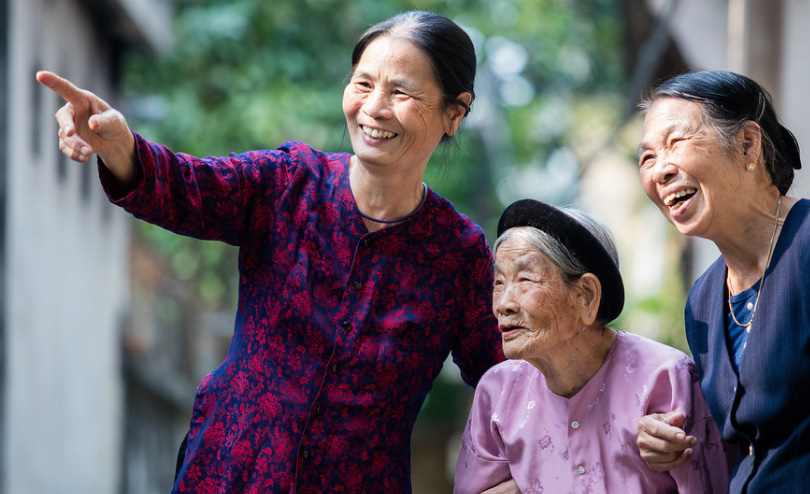
Sarah Mistry has been Chief Executive of the BGS since 2019. She previously worked in international development and is on the board of Gender Links South Africa.
Today, Saturday 1 October, is the UN’s International Day of Older Persons. Each year the UN takes a particular thematic focus: this year it is ‘The Resilience and Contributions of Older Women’. It is an opportune moment to reflect on older women’s experience of healthcare.
Women in the UK on average live longer than men. They are more likely to be living on their own into older age, often as a result of being widowed. They spend a significantly greater proportion of their lives in ill-health and disability when compared to men. A longer lifespan means women in the UK spend more years living with frailty than men do. In recent years, the most common cause of death for both sexes aged 80 and over has been dementia and Alzheimer’s disease. For younger older people (aged 65 to 79) the cause of death for men is more likely to be heart disease while the most common cause of death for women is lung cancer. In addition, women are more prone to long-term conditions such as osteoporosis. The recently published ‘Women’s Health Strategy’ in England describes how the health and care system has historically been designed by men and for men, as can be seen through research and clinical trials, education and training for healthcare professionals and the design of healthcare policies and services. The new Strategy sets out some initial steps to addressing this disparity.
But if you are a woman living in a lower income country, the structural inequality you experience in terms of access to healthcare and health outcomes is even more significant and likely to be magnified as you reach older age. We are roughly midway through the fifteen-year period of the Sustainable Development Goals which were agreed globally under the auspices of the United Nations in 2015. The 5th goal is about gender equality with a mission to ‘achieve gender equality and empower all women and girls. In too many countries of the world, women face discrimination and inequality in older age, often as a result of disadvantages accumulated over the life course. Financial insecurity, exposure to sexual violence, caregiver obligations, unequal educational opportunities and traditional structures mean that older women in lower income countries are more vulnerable than men in the event of an economic, climate or humanitarian crisis. Combining this gender inequality with ageism increases the disproportionate effect of discrimination on older women.
According to the World Economic Forum, the COVID-19 pandemic, in the space of a mere two years, has increased the gender wealth gap by a generation. The third of the SDGs is about good health and wellbeing, aiming to ‘ensure healthy lives and the promotion of wellbeing for all at all ages, an ambition set back by the pandemic. Sadly, the COVID pandemic has taken a harsh toll on older and more vulnerable people and exacerbated health inequalities worldwide, bringing fresh urgency to the goals of the UN Decade of Healthy Ageing 2021-30. This aims to bring together governments, civil society, international agencies, professionals, academia, the media, and the private sector to improve the lives of older people, their families, and the communities in which they live.
Closer to home and even without the effects of the pandemic, there are also questions of equity to be asked, relating to the intersection of age, gender and health. Inequalities owing to your gender or age may be compounded by your socio-economic circumstances or other ‘protected characteristics’, with this ‘intersectionality’ magnifying the differences at all stages of the healthcare journey. That is why the BGS supports the Core20PLUS5 approach adopted by NHS England to reducing health inequalities, and is a member of the RCP’s Inequalities in Health Alliance. We are disappointed to hear reports this week that the new Health and Social Care Secretary, Thérèse Coffey, will no longer be publishing the promised Health Disparities paper. In the current turbulent times, with the rising cost of living and the massive pressures on the health service, the likelihood is that inequalities will continue to increase unless there is serious and sustainable action to address this.
I am writing this at the end of the second day of the European Geriatric Medicine Society Congress, being held in London, with the BGS as the local host. Some speakers have disaggregated health data by sex and noted differential effects or outcomes. Sometimes different health behaviours are described. Women may be more likely to see their GP earlier, but they have 20% lower rates of being referred for cardiac rehabilitation than men, according to a new report on inequity in the provision of rehabilitation, published this week by the Chartered Society of Physiotherapists. As we celebrate the International Day of Older Persons 2022 with its focus on older women, let us ensure equality and inclusion lie at the heart of healthcare practice, and ensure that we are vigilant to counter ageism and gender inequity.
